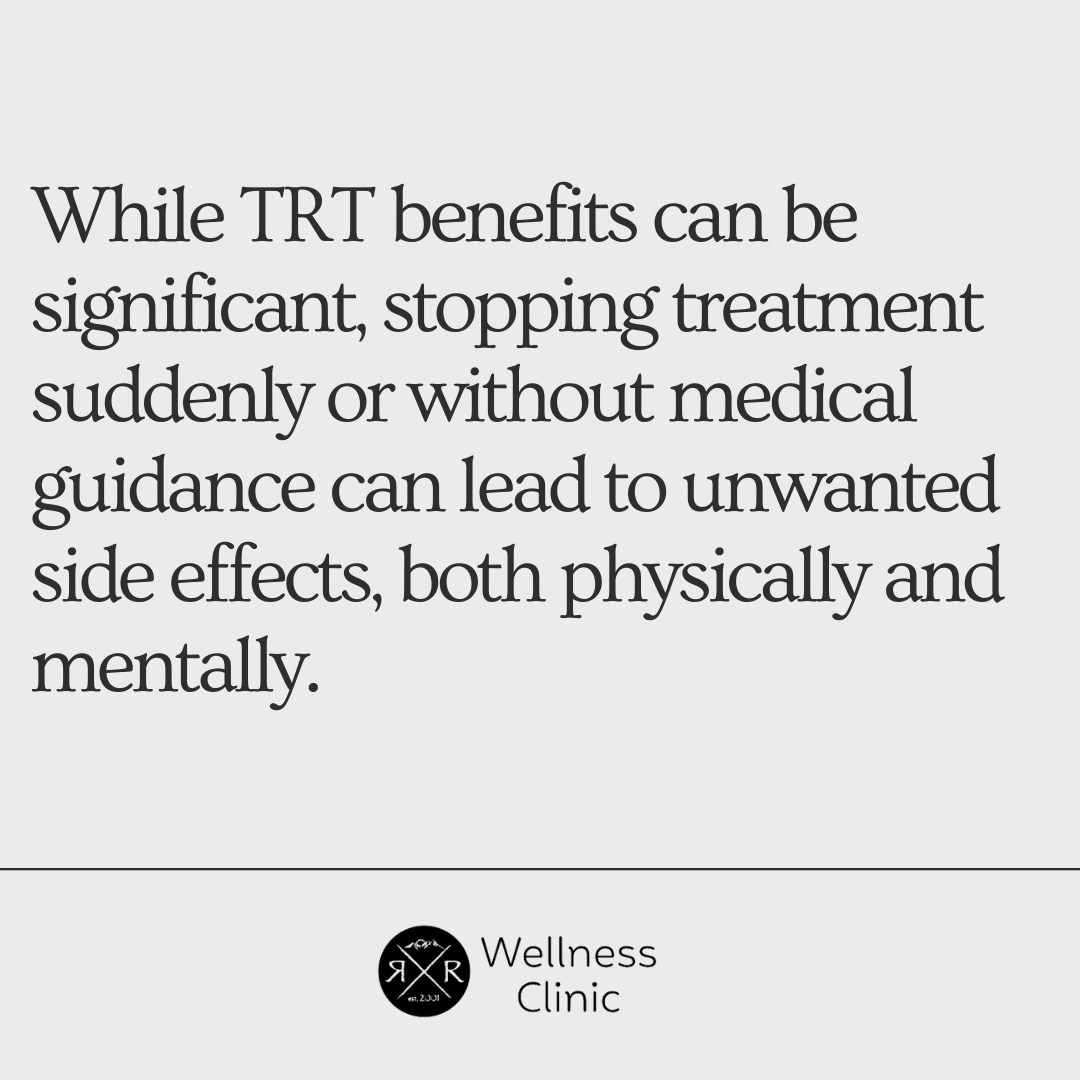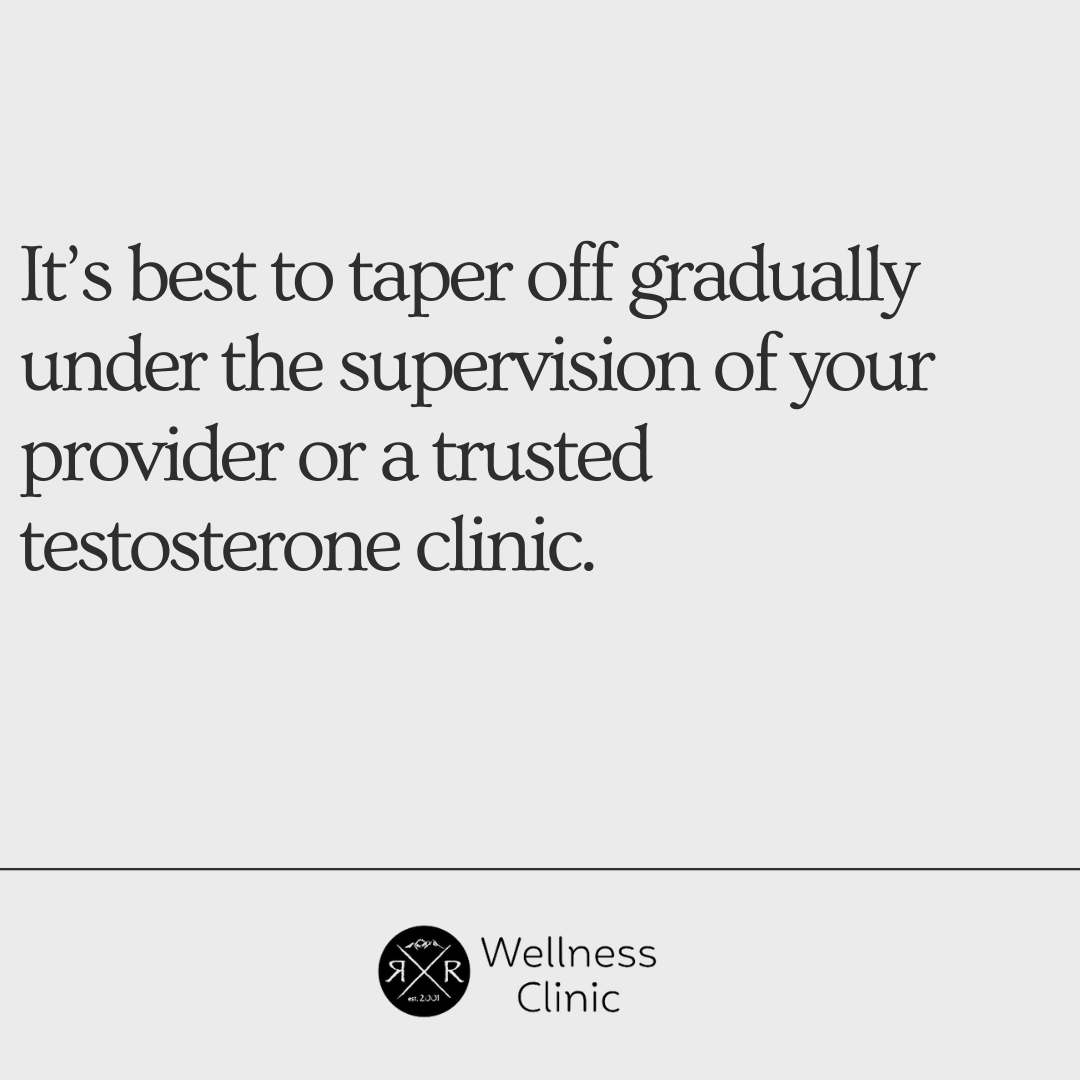By now, you might already be familiar with the basics of testosterone replacement therapy (TRT). Maybe you're currently on it, or you're considering it to boost energy, improve mood, or address low testosterone levels. But at some point, a common question comes up: Can you stop taking testosterone therapy once you’ve started?
The short answer is yes, but it’s not as simple as just quitting cold turkey. While TRT benefits can be significant, stopping treatment suddenly or without medical guidance can lead to unwanted side effects, both physically and mentally.
In this blog, you’ll learn what really happens when someone discontinues testosterone therapy. We’ll break down why some people choose to stop, the changes your body may go through, and how to approach the transition safely with medical support.

Why People Consider Stopping TRT
There could be several reasons you or others might question: Can you stop taking testosterone therapy? While many people experience positive results, TRT isn’t the right fit for everyone long-term.
Here are some common motivations for stepping away from treatment:
Side Effects
Even with proper dosing, some people experience side effects like acne, hair thinning, increased irritability, or mood changes. These can become frustrating over time and may prompt you to reevaluate your decision.
Lifestyle or Financial Changes
Testosterone therapy requires ongoing appointments, lab work, and prescriptions. If your schedule shifts or finances tighten, maintaining consistent care can feel overwhelming or unsustainable.
Evolving Health Goals
Sometimes your health priorities change. At one point, you could be searching for testosterone therapy near me. Now, you may no longer feel aligned with the reasons you started TRT. Or perhaps a new medical condition makes continuing less ideal. In these cases, stepping back can be a thoughtful, intentional choice.

What Happens If You Stop Testosterone Therapy?
Stopping testosterone therapy isn’t without consequences, especially if your body has already relied on it for hormone balance. Once you stop, your testosterone levels may drop suddenly, and it can take time for your body to adjust (if it adjusts at all).
Some common symptoms you might experience include:
- Fatigue and low energy
- Mood changes or depression
- Decreased libido or sexual performance
- Muscle loss and increased body fat
- Trouble focusing or mental fog
If you started TRT due to hypogonadism or another medical condition, these symptoms may return or worsen once the treatment ends. In such cases, your body may not produce enough testosterone on its own, making long-term therapy necessary.
That’s why it’s important to talk to a qualified provider. Searching for testosterone clinics near me can connect you with experts who understand how to manage the transition safely and minimize side effects.

Can You Stop Safely? Yes, But It Requires Medical Guidance
So, can you stop taking testosterone therapy without harming your health? Technically, yes, but doing it safely is key.
As you learned, quitting cold turkey can trigger a sudden hormone crash, leaving you feeling worse than before you started. But how do you minimize risks?
It’s best to taper off gradually under the supervision of your provider or a trusted testosterone clinic. This allows your body time to adjust and gives your care team a chance to monitor symptoms and support you through the transition.
In some cases, your provider might recommend supportive therapies like HCG (human chorionic gonadotropin) or SERMs (selective estrogen receptor modulators). These medications can help stimulate your body’s natural testosterone production and ease withdrawal symptoms.
The most important takeaway? Don’t go it alone. The safest and most effective path off TRT is the one you take with expert medical support.
The Role of Local Clinics and Ongoing Support
Whether you’re starting or stopping treatment, having the right care team matters. A trusted TRT clinic near me can help you navigate changes to your hormone therapy while protecting your long-term health. These clinics often provide more than just prescriptions; they offer personalized plans and monitoring tailored to your goals.
Here’s how local clinics can provide ongoing support for recovery:
- Customized tapering plans to reduce risks when discontinuing TRT
- Regular bloodwork and symptom tracking to monitor hormone levels
- Access to supportive therapies like HCG or SERMs to aid in hormone balance
- Lifestyle guidance, including fitness, nutrition, and stress management, to support hormone health
- Mental health referrals or counseling if emotional side effects arise during the transition

Conclusion
Can you stop taking testosterone therapy? Yes. However, doing it safely requires medical guidance, especially if you've been on TRT for a while or started due to an underlying condition. Stopping suddenly can lead to hormone crashes and uncomfortable side effects, but tapering with professional support can ease the transition and protect your health.
At RR Wellness Clinic, a trusted Utah wellness clinic, you’ll get the personalized care and ongoing support you need, whether you're beginning TRT, adjusting your dose, or ready to step away. To learn more, talk to our team today!
Reviewed by:

